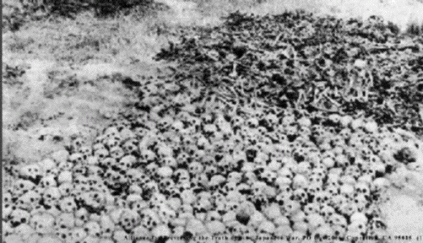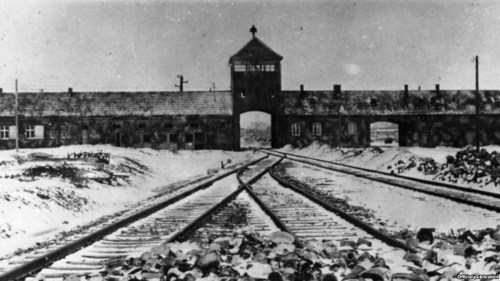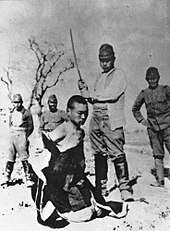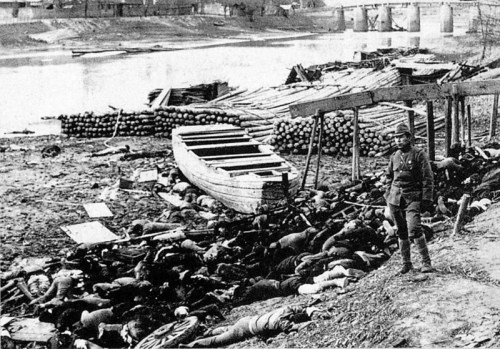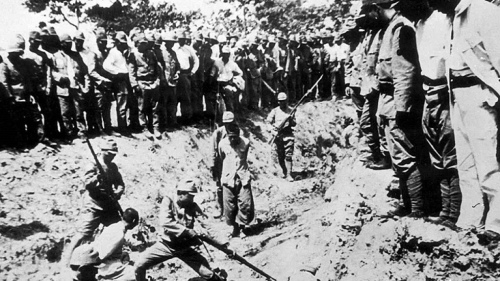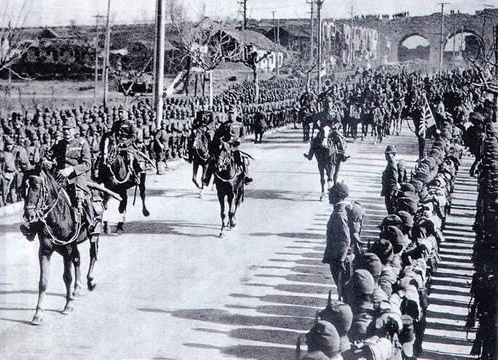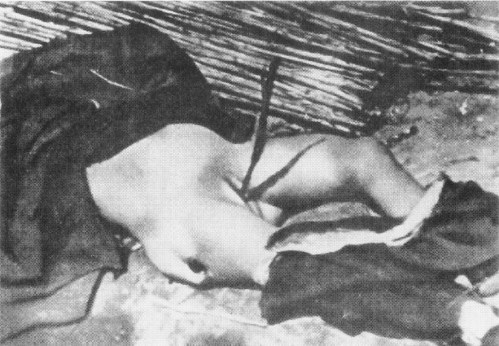
Friends of Padre Steve’s World,
Seventy-six years ago today the Soviet Red Army’s 100th Division liberated the Auschwitz Concentration Camp. There were somewhere between 7000 and 9000 prisoners left in the camp when the Soviet soldiers liberated it. The camp’s crematoria had been destroyed as well as most of the gas chambers. The SS had evacuated most of the surviving inmates and slave laborers by forced march to railhead miles away from the camp, in order to take them to other Concentration Camps deeper in Germany; Buchenwald, Bergen-Belsen, Ravensbruck, and others.
Even though Auschwitz was liberated, the Nazis continued to exterminate Jews at other camps. Likewise in vain attempts to cover up their crimes and keep killing Jews through forced labor conducted forced marches in freezing winter weather to keep them from being liberated. These marches were both deadly and inhuman. Even Heinrich Himmler the supreme architect of the policy of annihilation had forbidden them in order to escape justice at the hands of the Allies who he was already attempting clandestine contact. Many of these actions were the work of SS Lieutenant Colonel Adolf Eichmann who supervised the Holocaust after the death of his chief, Reinhard Heydrich. Even though the Third Reich was collapsing under the hammer blows of the Western Allies and Soviets, and the defection of critical allies like Finland, Hungary, Romania, and Bulgaria from the Axis fold.
Even Rudolf Höss the former Commandant of Auschwitz, who admitted to killing over one and a half-million Jews, was appalled by the senseless brutality of what he saw. Höss, the meticulous killer of millions, was shocked by the columns of emaciated and Jews, with no winter clothing or in many cases not even shoes that that he witnessed. These were the people Eichmann marched from Budapest and other cities and camps to Austria and Czechoslovakia in late 1944 and 1945. to keep the Russians from liberating them, even against the orders of Heinrich Himmler himself. But Eichmann felt the heartbeat of Adolf Hitler who remained determined to kill every last Jew in German held Europe as he led Germany into its Götterdämmerung.
There have been many episodes of genocide in human history, but none were more pointedly directed at a single group of people based on race hatred than the Holocaust of the Nazis and their allies against the Jews. While it is true that the Nazis exterminated millions of other people than the nearly six million Jews they dispatched during the Holocaust, but they were secondary targets of his race hatred. This is important, as the late Christopher Hitchens noted:
“We should not at all allow ourselves to forget the millions of non-Jewish citizens of Belarus, Russia, Ukraine, and other Slav territories who were also massacred. But for me the salient fact remains that anti-Semitism was the regnant, essential, organizing principle of all the other National Socialist race theories. It is thus not to be thought of as just one prejudice among many.”
Hitchens was right, without the primary Nazi hatred and determination to obliterate the Jews from the face of the earth, their other atrocities would never occurred. Today, that rabid anti-semitism is again raising its evil head in Eastern and Western Europe, the Middle East, and even in the United States. We have seen it in the resurgence of heavily armed and violent Neo-Nazi and White Supremacist groups in the United States whose ranks include current and former military personnel and law enforcement officers. The same is true in Europe. In the United States many members of these Anti-Semitic militant groups led the attack on the United States Capitol after being incited to do so by for ex-President Donald Trump.
Red Army officers and soldiers who had seen the worst of Nazi atrocities committed in Russia, the Belarus, the Ukraine and the Baltic states were unprepared for what they witnesses when the liberated Auschwitz:
Battle-hardened soldiers who were used to death were shocked by the Nazis’ treatment of prisoners. Red Army general Vasily Petrenko, commander of the 107th Infantry Division, remarked, “I who saw people dying every day was shocked by the Nazis’ indescribable hatred toward the inmates who had turned into living skeletons. I read about the Nazis’ treatment of Jews in various leaflets, but there was nothing about the Nazis’ treatment of women, children, and old men. It was in Auschwitz that I found out about the fate of the Jews.”
Ivan Martynushkin, then a 21-year-old lieutenant recounted his experience at Auschwitz in 2015:
“We saw emaciated, tortured, impoverished people…. Those were the people I first encountered. … We could tell from their eyes that they were happy to be saved from this hell. Happy that now they weren’t threatened by death in a crematorium. Happy to be freed. And we had the feeling of doing a good deed — liberating these people from this hell.” He told the Daily Mail: “I had seen towns destroyed…. I had seen the destruction of villages. I had seen the suffering of our own people. I had seen small children maimed. There was not one village which had not experienced this horror, this tragedy, these sufferings.”
He was not alone.
Commander Vasily Gromadsky was one of the first to enter the “death camp”:
There was a lock on the gate. I didn’t know if it was the main entrance or what. I ordered men to break the lock. There wasn’t anyone there. We walked another 200 meters and saw prisoners in striped shirts running towards us, about 300 of them.
We became wary, since we had been warned that the Germans could be in disguise. But they were real prisoners. They were crying, embracing us. They told us that millions of people had been killed there. I can still remember them telling us how the Germans had sent 12 wagons of baby carriages from Auschwitz.
Journalists from the 38th army Usher Margulis and Gennady Savin entered the camp after the soldiers. This what they remember:
We entered the brick building and looked inside the rooms. The doors weren’t closed. In the first room there was a huge pile of children’s clothes: little coats, jackets, sweaters, many of them with bloodstains. In the next room there were boxes filled with dental crowns and golden dentures. In the third room there were boxes with woman’s hair. And then a woman [a prisoner – Russia Beyond] brought us to a room filled with boxes with women’s bags, lampshades, wallets, purses and other leather items. She said: “All this is made from human skin.”
After Auschwitz was liberated, the Soviets appointed a new commandant was to administer the town, Grigory Yelisavetinsky. On Feb. 4, 1945 he wrote to his wife:
“There’s a children’s barrack in the camp. Jewish children of all ages (twins) were taken there. The Germans carried out experiments on them as if they were rabbits. I saw a 14-year-old boy whose veins had been injected with kerosene for some “scientific” purpose.
Then a piece of his body was cut off and sent to a laboratory in Berlin, while it was replaced with another piece of the body. Now he lies in a hospital all covered with deep rotting ulcers and nothing can be done to help him. There’s a beautiful girl walking around the camp. She’s mad. I’m surprised that not all the people here have gone mad.”
Eva Mozes Kor was 10 years old when she spotted the soldiers. She was one of a group of hundreds of children who had been left behind, and she had endured medical experiments during her imprisonment. She remembered how the soldiers gave her “hugs, cookies and chocolate….We were not only starved for food but we were starved for human kindness.”
The human kindness of the Soviet Soldiers characterized the liberation. The shocked soldiers helped set up hospitals on site, and townspeople volunteered to help. For months, Polish Red Cross workers labored to save the dying and treat the living, working without adequate food or supplies and helping prisoners get in touch with their loved ones. About 7,500 of those liberated on 27 January 1945 survived.
It is impossible for an objective person to deny these facts. Hate crimes against Jews are blossoming around the world like toxic mushrooms. The new perpetrators are the descendants of the former perpetrators, Protestant, Catholic, and Orthodox Christians, Muslims, and secularists who embrace the same social Darwinism that motivated many of the Nazis and many are central to the ever growing core or Holocaust Deniers.
Or course the non-Muslim opponents of the Jews today also despise dark skinned minorities, non-Christians, not to mention atheists. secularists, and political liberals and progressives, even if they are White and Christian, thus what Hitchens says is still as accurate as it was when he wrote those words.
So here we are, Holocaust Remembrance Day, 2021. The question is, will we allow it to happen again? The late Iris Chang, who documented the Rape Of Nanking noted: “to forget a holocaust is to kill twice.” Sadly, I believe that without a sea change in public opinion and knowledge about the Holocaust, genocide, and anti-semitism we will see it happen again. The attack on the Capitol was just a foretaste of what they would do if they even succeed in taking power.
But will we allow it to happen again? I would hope not, but I have to say that human nature and the course of events is leading me to believe that it will happen again, maybe even in our lifetime.
That may be difficult to accept, but it is reality. What is the alternative to telling the truth? Except to perpetuate a lie, except to take the side of the perpetrators, and those who would do the same today. That includes many of former President Trump’s most loyal supporters, Evangelical Christians who while outwardly allying with Israel, only do so in that their interpretation of Biblical prophecy might be fulfilled. That interpretation is that Christians will be raptured from the earth, and during a seven year Great Tribulation the Anti-Christ will conquer his foes and that in the end over two-thirds of all Jews will be killed, while the surviving Jews convert to follow Christ. Evangelical Christianity’s beliefs about Israel are not out of love or concern for Jews, the nation of Israel, but to use them to promote their own political and theological agendas. If I was a Jew of any kind I would reject any of their offers.
Honestly, I cannot deem such politicized and racist theology to be Christian, or respectful and considerate of the elder brother of the Christian faith, Judaism, without which Christianity wouldn’t exist. Let me repeat that. Without Judaism Christianity would not exist, and the treatment of the Jews by the Christian Church has been shameful for the majority of its existence. I say that as a Christian.
In the 1930s and 1940s the Nazis created the euphemism the Jewish Question in order to remove the aspect of humanity from their policy. It wasn’t about human beings, it was about people that they considered sub-human minority that they were able to demonize to expedite their elimination. Hitchens wrote:
“Die Judenfrage,’ it used to be called, even by Jews. ‘The Jewish Question.’ I find I quite like this interrogative formulation, since the question—as Gertrude Stein once famously if terminally put it—may be more absorbing than the answer. Of course one is flirting with calamity in phrasing things this way, as I learned in school when the Irish question was discussed by some masters as the Irish ‘problem.’ Again, the word ‘solution’ can be as neutral as the words ‘question’ or ‘problem,’ but once one has defined a people or a nation as such, the search for a resolution can become a yearning for the conclusive. Endlösung: the final solution.”
Thus, once one labels the Jews, or for that matter any other despised minority a question, or a problem, we place ourselves on the path to to Genocide. But the Trump administration and his followers did that since 2015 regarding Mexicans and other Hispanics, Arabs, Haitians, Sub-Saharan Africans, and too many others. Many died, women were forcibly sterilized by physicians employed or contracted by the our Border and Emigration departments.
That is why I cannot be silent. I have to proclaim the words of Ellie Wiesel:
“I swore never to be silent whenever and wherever human beings endure suffering and humiliation. We must take sides. Neutrality helps the oppressor, never the victim. Silence encourages the tormentor, never the tormented.”
Silence it no longer an option, and to again quote Wiesel: “For the dead and the living, we must bear witness.”
We must bear witness, for if we do not it will happen again. Humanity is the one constant in history, and there are no exceptions once one begins down the path to labeling the fate of races, nations, and peoples a question or a problem which they can resolve with a solution, the more comprehensive, total, or final, the better. There are certainly plenty of people, including Trump’s closest advisors who would make draconian laws in order to enable the government to commit genocide.
Historian Yehuda Bauer wrote:
“The horror of the Holocaust is not that it deviated from human norms; the horror is that it didn’t. What happened may happen again, to others not necessarily Jews, perpetrated by others, not necessarily Germans. We are all possible victims, possible perpetrators, possible bystanders.”
In the wake of an number of situations that I have seen and have watched in morbid fascination be debated on my Facebook, and Twitter timelines, as well a potential Holocaust Denier who commented on my blog a year ago, I realize that with the prevailing attitudes being stoked by men like former President Trump, his media supporters, and sadly, far too many Conservative Christians, that a Holocaust not unlike Hitler’s will quite probably happen again, and the Jews, followed by the Trump Cult’s liberal political opponents, American Blacks, Muslims, Mexican and Central American immigrants and refugees and a multitude of others find themselves the targets of first political and economic isolation followed by legal or extralegal means of political persecution, imprisonment, and extermination. Just read and listen to what members of the GOP, political pundits, and yes right wing political preachers say, preach, or write.
I will fight it, butI have no doubt of the power, passion, and petulance of people consumed by race hatred under the guise of patriotism. They are going to undercut any Constitutional liberties of their opponents and will misused the Constitution, our laws, or even Christian theology to bring on another Holocaust.
27 January is important, but the work of preventing even worse still remains. There are no “good Nazis or White Supremacists” today. I will be damned if I do not fight them by any means fair or unfair. I will identify them, show their faces and make them defend themselves and their beliefs in public, because they are indefensible. Such people should be publicly identified and shamed. If they commit crimes as they did on 6 January they should be prosecuted to the maximum extent of the law, and I include the former President, the Senators, and Representatives, state office holders, military personnel active, reserve, and retired, and law enforcement officers who aided and abetted that assault on our country, democracy, and Constitution. They are insurrectionists who are guilty of inciting sedition and rebellion against the United States, who are still intent on their revolution to overturn our government, a valid election, and our Constitution. They are worse than the Confederate rebels, they are no different than the Nazis, and any American of any political party, religious affiliation, or race should disavow them and oppose them at every opportunity.
This is a time to stand against these criminals masquerading as Senators and Congressmen, and oppose their attempts to destroy the American experiment for an authoritarian, fascist, racist, and theocratic dictatorship which will certainly bring forth another Holocaust, and yes, Jews will be the primary target before anyone else.
I do battle with Holocaust deniers and Neo-Nazis on an almost daily basis. Some have threatened my life and that of my family for over a decade and most of them also call themselves Christians. That I cannot allow to go unrevealed and I will expose them for who and what they are. I will not resort to violence, but if need be I will defend myself with whatever means necessary as I will my Jewish friends and anyone else’s whose lives are threatened by the current Neo-Nazi and White Supremacist and others committed to perpetuating the lies and violence of America’s leading Fascist, former President Donald John Trump.
Until tomorrow,
Peace,
Padre Steve+

































